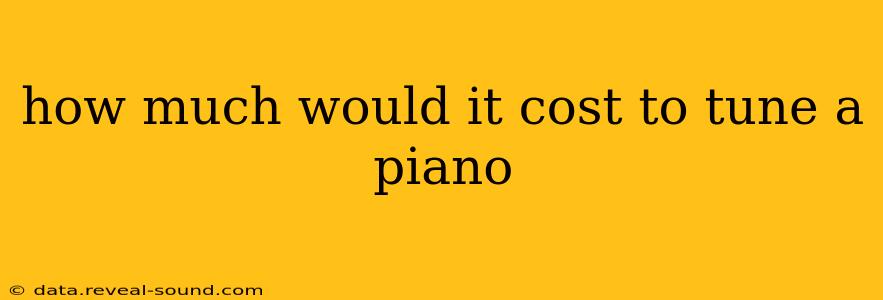How Much Does it Cost to Tune a Piano?
The cost of tuning a piano can vary significantly depending on several factors. While you might find some cheaper options, understanding the nuances behind the pricing helps you make an informed decision and ensures you're getting a quality service. This guide will explore the factors affecting piano tuning costs and answer some frequently asked questions.
What factors influence the price of a piano tuning?
Several factors contribute to the final cost of tuning your piano:
- Location: Piano tuners in densely populated urban areas often charge more than those in rural settings due to higher overhead costs, travel time, and demand.
- Technician Experience: Experienced and highly qualified piano technicians, especially those with specialized certifications, tend to charge higher rates. Their expertise is worth the investment as they ensure a precise and longer-lasting tuning.
- Type of Piano: Tuning an upright piano is generally less expensive than tuning a grand piano, due to the instrument's size and complexity. Grand pianos require more time and effort for a thorough tuning.
- Piano Condition: If your piano is severely out of tune or requires extensive repairs beyond a standard tuning, the cost will increase. Significant damage or neglect can lead to higher labor charges.
- Service Type: A simple tuning will cost less than a tuning that includes regulation (adjusting the action) or other repairs. Regulation is essential for optimal playability and can significantly improve the piano's overall performance.
How much do piano tuners typically charge?
A standard piano tuning typically ranges from $100 to $250 in the United States. However, this is a broad range, and the actual cost can fall anywhere within or even outside these limits depending on the factors mentioned above. It's always best to get quotes from multiple piano tuners in your area to compare prices.
What is the difference between a piano tuning and a piano regulation?
A tuning focuses on adjusting the pitch of each string to the correct frequency. Regulation, on the other hand, addresses the mechanical components of the piano action—the system that connects the keys to the hammers. Regulation involves adjusting things like the hammer alignment, key dip, and repetition levers to ensure consistent and responsive touch. Regulation is a more extensive and costly service than a simple tuning.
How often should I tune my piano?
Ideally, a piano should be tuned twice a year, especially in environments with fluctuating temperature and humidity. However, newer pianos might require tuning less frequently. If you notice your piano is noticeably out of tune, it's time to schedule a tuning, regardless of the timeframe.
How can I find a reputable piano tuner?
Finding a reputable piano tuner involves some research. Ask for recommendations from local music stores, teachers, or other pianists. Check online reviews and consider contacting several tuners to inquire about their experience, qualifications, and pricing. A reputable tuner will be happy to answer your questions and provide a detailed quote.
Are there any ways to save money on piano tuning?
While saving money shouldn't compromise quality, you can explore a few options:
- Shop around: Get quotes from multiple tuners to compare prices and services.
- Negotiate: Don't be afraid to politely negotiate, particularly if you're getting multiple services or have a long-term agreement.
- Bundle services: Consider bundling tuning with other services like regulation or repair to potentially get a discount.
By understanding the factors affecting the cost of piano tuning and asking the right questions, you can ensure your piano receives the care it deserves without breaking the bank. Remember, investing in regular tuning and maintenance is crucial for preserving your piano's value and musical integrity.
